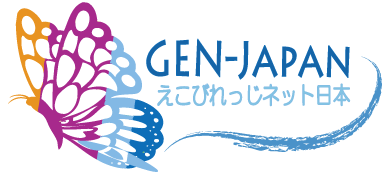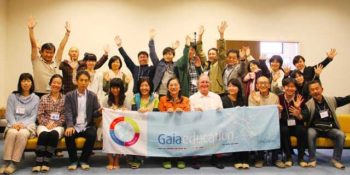| 名 称 | 特定非営利活動法人GEN-Japan |
| 設 立 | 2016年7月26日より法人として開始 |
| 所在地 | 三重県鈴鹿市阿古曽町14-28 |
| 連絡先 | gen.jp2015@gmail.com |
| 役 員 | 代表理事 片山弘子 副理事 空閑厚樹 副理事 小森伸一 理事 熊倉敬聡 監事 辻村 勇 |
| 顧 問 | 内藤正明 (京都大学名誉教授・ 滋賀県琵琶湖環境科学研究センター長) 谷崎テトラ(京都造形芸術大学創造学習センター教授・ ワールドシフトジャパン代表) |
| 定 款 | こちらをクリックして下さい |
| 本 部 | Global Ecovillage Network |
| 貸借 対照表 |
2017年度 / 2018年度 / 2019年度 / 2020年度 |
旧ホームぺージをご覧頂く場合はこちらをクリックしてください。
Instagram Facebook
 グローバル・エコビレッジ・ネットワーク(以下GEN)とは?
グローバル・エコビレッジ・ネットワーク(以下GEN)とは?
世界中の政策立案者、政府、NGO、学者、起業家、活動家、
GENは、世界に広がる5つの地域ネットワークと、
 グローバルエコビレッジネットワーク=ジャパン(GEN-
グローバルエコビレッジネットワーク=ジャパン(GEN-
30以上の団体や学者、起業家、活動家、エコビレッジとともに、とくにどんな時でも話し合いができる、コミュニティづくりの中核となれるような教育プログラムの実施、人材の発掘、コミュニティづくりや運営に関するコンサルタント事業を行っています。
 エコビレッジとは?
エコビレッジとは?
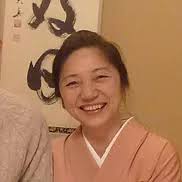
片山弘子
Hiroko Katayama
代表理事
Representative
グローバルエコビレッジネットワーク(GEN)-Japan代表理事。GENのAmbassador, オセアニア・アジア地域Wisdom Keeper。持続可能なコミュニティづくりのための、教育プログラムデザイナーとしての経験をアドバイスしている。国内ではエコビレッジやローカリゼーション活動の取り組みをネットワークして日本全体の持続可能性に向かう動きを強化する取り組みを続けている。2014年より「持続可能なコミュニティづくりのためのカレッジ」。2015年から「人を聴くためのカレッジ」を実施(~現在)。2017年GEN-Japan'EDEガイアエデュケーションをユネスコから認証を受けて実施を始める。
鈴鹿市環境審議会委員(2012年~2013年)。
Kyoto Institute of Ecosound Societies(KIESS)創設メンバー。広島大学教育学部卒業。早稲田大学文学研究科にてユルゲン・ハーバーマスの市民的公共性から、話し合いのプラットフォームづくりを研究した。
翻訳『ニーム』 地球規模の問題を解決する木 (緑風出版、2005 National Reserch Council US)。「インドにおけるJFM(インドの伝統的森林管理」(2002年KIESS レポート)インド型マイクロクレジット;セルフヘルプ・マネジメント、KIESSレポート2003 エッセイ:「科学的とはどういうことか?」
Born in 1955
She is a plan designer, organizer and educator of
sustainable educational program.
Executive Director of GEN-Japan since 2016.
She joined As One Community in 2009 for learning
and studying the personal development and social
system development for regenerative societies.
Based on her more than 35 years community living,
she has planed and started creating the innovative
educational programs for practical development of
sustainable relationship and the social systems free from conflict or opposition, where everyone can live as each is.
Since 2014, She has innovated and run "The College for Sustainable Community Building"
and since 2015 and “ The Lesson of listening to people”.
She joined GEN-Japan’s EDE 2017
GEN-Japan’s EDE program has been organized by her since she joined the TOT program in ALT Course under Pracha Hutanuwatr in Thailand in January of 2018.
Founder member of Kyoto Institute for Sustainable Social Systems;KIESS (2000--),
A member of 2012 Environmental Council of Suzuka city,
Bachelor of Education from Hirioshima University,
Waseda University Research Course for professionals
to study on Civil Publicness of Jürgen Habermas at Literature of Waseda University
Translation: Neem A tree for solving global problems (Ryokuhuu Shuppan 2005 National Reserch Council US)
Theses: JFM in India ( traditional forest management of India, 2002 KIESS
Report ), India's special micro-credit; Self-Help-Management, KIESS Report 2003

空閑厚樹
Atsuki Kuga
副代表理事
Vice representative
立教大学コミュニティ福祉学部教員。持続可能なコミュニティ実践の観点から生命倫理を研究している。一般に生命倫理は高度な医療実践をめぐる倫理的課題を論じるものとして考えられているが、生命倫理の「生命」には生活やライフスタイルも含まれていることを踏まえ、現代の産業化された社会におけるライフスタイルを生命倫理の課題として検討している。第二期EDE(エコビレッジ・デザイン・エデュケーション)運営委員。
現在、埼玉県小川町の地域活性化活動にも取り組んでいる。
Atsuki is a professor in the College of Community and Human Services of Rikkyo University in Japan. He teaches, studies, and practices bioethics from a sustainable community perspective. Bioethics is often considered an academic field wherein moral issues newly raised by cutting-edge medical technology are discussed. Still, he thinks that bioethics isn’t just limited to the medical field. Bio in bioethics comes from “human life” in Greek, or more concretely, livelihood, living, and lifestyle. So a way of living in industrialized societies is a bioethical issue, too. Building trustful relationships among community members, fostering shared value, and shaping sustainability concepts in bioethical fields are his current concerns.
He was a steering committee member of the second Ecovillage Design Education (EDE) in Japan from 2010 to 2011 and is currently participating in revitalization activity in Ogawa, Saitama, a district located in a hilly, mountainous rural area and also suffering from depopulation problems.
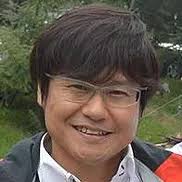
小森伸一
Shinichi Komori
副代表理事
Vice representative
国立大学 東京学芸大学の教員をしています(准教授/学長補佐:2017年現在)。私の大学は教員養成大学となりますので軸となる専門は教育(学)となります。その中でも主な研究分野は、ホリスティック理論及びホリスティック教育を基盤とした野外環境教育、サステイナビリティ教育、体験学です。これらは全て、直接体験を通じた根本的に実践的な学びであり学問となります。特に最近では、「幸福学」及びその下支えとなっている研究分野の「ポジティブ心理学」から出されている成果を軸にして上記の研究領域について探求しています。
I, an associate professor/adviser to the president, Ph.D, am teaching at Tokyo Gakugei University (TGU, national university), which is a teacher’s college in Japan; therefore, my major at the basis is education. The main study field is about “outdoor-environmental education,” “sustainability education,” and “experience study” based on holistic theory and holistic education, which are all fundamentally practical learning and study through firsthand experience. Recently, I, in particular, explore the above-mentioned area in terms of the outcomes from “happiness study” and also “positive psychology” supporting the knowledge.
I had graduated from the undergraduate and master courses at TGU (B.Ed. & M.Ed.) and then went to Canada to study continuously. I had spent about two and half years at University of Saskatchewan (second “M.Ed” obtained) and then stayed for seven years at the University of British Columbia (“Ph.D” obtained). Being linked by fate, I, after that, have been teaching at TGU, my old school, since April in 2008. Thinking about such long-terms of school life, I might be called as an academic traveler, or academic gypsy, in a sense. Currently, I am no longer such a gypsy due to working by full-time at the university。On the other hand, I want to be always a “seeker/educator in action” to be able to contribute to achieving sustainable society/living based on persistent well-being for individuals and groups and on holistic learning/education.
Our Work
教育事業
「ユネスコGAP教育プログラム」
ガイアエデュケーションは、エコビレッジデザインエデュケーション(EDE)として1998年からスタートし、現在まで5大陸で、先進国、途上国をふくめて45カ国約100会場で開催され、世界各地で多くの人材を輩出しながら、持続可能な社会づくりの推進と、それに必要なカリキュラムを作り上げてきました。
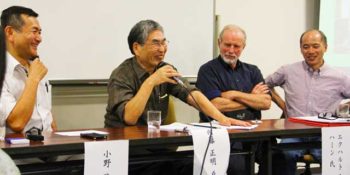
啓蒙事業
「やさしい社会国際フォーラム」
近年、日本でも、市民が主体となった街づくりが活発になってきました。大きな転機を迎えた私たちの暮らしを見直し、私たちの足元に暮らしやすいつながりを取り戻していくためのヒントを学び取るために、環境先進国のドイツからエクハルト・ハーン(ドルトムント大学教授)をお招きして毎年講演を開催しています。
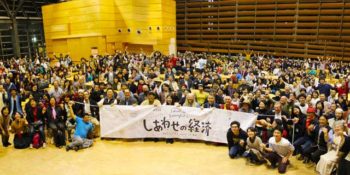
交流事業
「ネットワーク交流」
いま各地で、安心できるコミュニティを自分たちの手で作ろうと願っている人達や、具体的に動き始めている動きがみられるようになってきました。NPO 法人えこびれっじネット日本GEN-Japan は、そのような思いの人達をネットワークし、各地に個性豊かな、持続可能な地域が実現できるようにサポートを進めています。
GEN-JAPAN会員募集中!
会員種別…正会員(団体の場合は選任された方)をもって、意思決定に参加します。
■正 会 員 この法人の目的に賛同して入会した個人又は団体
(入会金:5,000円/年会費:個人5000円、 団体10,000円)
■賛助会員 事業を賛助するため入会した個人又は団体
(入会金:なし /年会費:個人3000円、 団体6,000円)
■学生会員 事業を賛助するために入会した学生及び学生に相当する個人
(入会金:なし /年会費:個人1000円)
会員登録をご希望の方は右記のフォームに直接入力されるか、
こちらをクリックしてお申込み下さい。
★正会員は会員登録は年度登録になります。(次回は2022/4/1-2023/3/31)
★賛助会員・学生会員は登録確定月から1年間になります。
例:2022/2/15の登録は、2023/1まで有効
★会費を下記の口座にお振込み下さい(初年度は入会金(正会員のみ)と年会費の合計)
口座名:(トクヒ)ジェンジャパン
(特定非営利活動法人GEN-Japan)
<ゆうちょ銀行からのお振込みの場合>
記号: 12270 番号: 30678601
<他銀行からのお振り込みの場合>
店名: 二二八 店番: 228(普通) 口座番号: 3067860
メルマガ及びメーリング登録のみの方はこちらをクリック
